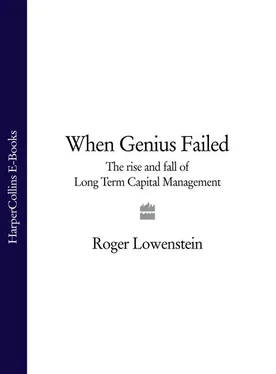In particular, a thirty-four-year-old trader named Paul Mozer was enraged. Mozer had been part of Arbitrage, but a couple of years earlier he had been forced to leave that lucrative area to run the government desk. Mozer had a wiry frame, close-set eyes, and an intense manner. In 1991, a year after the storm over Hilibrand’s pay, Mozer went to Meriwether and made a startling confession: he had submitted a false bid to the U.S. Treasury to gain an unauthorized share of a government-bond auction.
Stunned, Meriwether asked, “Is there anything else?” Mozer said there wasn’t.
Meriwether took the matter to Gutfreund. The pair, along with two other top executives, agreed that the matter was serious, but they somehow did nothing about it. Although upset with Mozer, Meriwether stayed loyal to him. It is hard to imagine the clannish, faithful J.M. doing otherwise. He defended Mozer as a hard worker who had slipped but once and left him in charge of the government desk. This was a mistake—not an ethical mistake but an error in judgment brought on by J.M.’s singular code of allegiance. In fact, Mozer was a volatile trader who—motivated more by pique than by a realistic hope for profit—had repeatedly and recklessly broken the rules, jeopardizing the reputation of Meriwether, his supervisor, and the entire firm. It must be said that Mozer’s crime had been so foolish as to be easily slipped by his superiors. Quite naturally, Meriwether, now head of Salomon’s bond business, hadn’t thought to inquire if one of his traders had been lying to the U.S. Treasury. But J.M.’s lenience after the fact is hard to fathom. A few months later, in August, Salomon discovered that Mozer’s confession to Meriwether had itself been a lie, for he had committed numerous other infractions, too. Though now Salomon did report the matter, the Treasury and Fed were furious. The scandal set off an uproar seemingly out of proportion to the modest wrongdoing that had inspired it. 14No matter; one simply did not—could not—deceive the U.S. Treasury. Gutfreund, a lion of Wall Street, was forced to quit.
Buffett flew in from Omaha and became the new, though interim, CEO. He immediately asked the frazzled Salomon executives, “Is there any way we can save J.M.?” Meriwether, of course, was the firm’s top moneymaker and known as impeccably ethical. His traders heatedly defended him, pointing out that J.M. had immediately reported the matter to his superior. But pressure mounted on all involved in the scandal. McIntosh, the partner who had first brought Meriwether into Salomon, trekked up to J.M.’s forty-second-floor office and told him that he should quit for the good of the firm. And almost before the Arbitrage Group could fathom it, their chief had resigned. It was so unexpected, Meriwether felt it was surreal; moreover, he suffered for being front-page news. “I’m a fairly shy, introspective person,” he later noted to Business Week . 15The full truth was more bitter: J.M. was being pushed aside—even implicitly blamed—despite, in his opinion, having done no wrong. This painful dollop of limelight made him even more secretive, to Long-Term Capital’s later regret. Meanwhile, within the Arbitrage Group, resurrecting J.M. became a crusade. Hilibrand and Rosenfeld kept J.M.’s office intact, with his golf club, desk, and computer, as if he were merely on an extended holiday. Deryck Maughan, the new CEO, astutely surmised that as long as this shrine to J.M. remained, J.M. was alive as his potential rival. Sure enough, a year later, when Meriwether resolved his legal issues stemming from the Mozer affair, Hilibrand and Rosenfeld, now the heads of Arbitrage and the government desk, respectively, lobbied for J.M.’s return as co-CEO. *
Maughan, a bureaucrat, was too smart to go for this and tried to refashion Salomon into a global, full-service bank, with Arbitrage as a mere department. Hilibrand, who was dead opposed to this course, increasingly asserted himself in J.M.’s absence. He wanted Salomon to fire its investment bankers and retrench around Arbitrage. Meanwhile, he made a near-catastrophic bet in mortgages and fell behind by $400 million. Most traders in that situation would have called it a day, but Hilibrand was just warming up; he coolly proposed that Salomon double its commitment! Because Hilibrand believed in his trade so devoutly, he could take pain as no other trader could. He said that the market was like a Slinky out of shape—eventually it would spring back. It was said that only once had he ever suffered a permanent loss, a testament to the fact that he was not a gambler. But his supreme conviction in his own Tightness cried out for some restraining influence, lest it develop a reckless edge.
Doubling up was too much, but management let Hilibrand keep the trade he had. Eventually, it was profitable, but it reminded Salomon’s managers that while Hilibrand was critiquing various departments as being so much extra baggage, Arbitrage felt free to call on Salomon’s capital whenever it was down. The executives could never agree on just how much capital Arbitrage was tying up or how much risk its trades entailed, matters on which the dogmatic Hilibrand lectured them for hours. In short, how much—if, sometime, the Slinky did not bounce back—could Arbitrage potentially lose? Neither Buffett nor Munger ever felt quite comfortable with the mathematical tenor of Hilibrand’s replies. 16Buffett agreed to take J.M. back—but not, as Hilibrand wanted, to trust him with the entire firm.
Of course, there was no way Meriwether would settle for such a qualified homecoming. The Mozer scandal had ended any hope that J.M. would take his place at the top of Salomon, but it had sown the seeds of a greater drama. Now forty-five, with hair that dipped in a wavy, boyish arc toward impenetrable eyes, J.M. broke off talks with Salomon. He laid plans for a new and independent arbitrage fund, perhaps a hedge fund, and he proceeded to raid the Arbitrage Group that he had, so lovingly, assembled.
*In practical terms, those who go short sell a security they have borrowed. They must return the security later—by which time, they believe, the price will have declined. The principle of buying cheap and selling dear still holds. Short sellers merely reverse the order: sell dear, then buy cheap.
*The Securities and Exchange Commission filed a civil complaint charging that Meriwether had failed to properly supervise Mozer. Without admitting or denying guilt, Meriwether settled the case, agreeing to a three-month suspension from the securities industry and a $50,000 fine.
Конец ознакомительного фрагмента.
Текст предоставлен ООО «ЛитРес».
Прочитайте эту книгу целиком, купив полную легальную версию на ЛитРес.
Безопасно оплатить книгу можно банковской картой Visa, MasterCard, Maestro, со счета мобильного телефона, с платежного терминала, в салоне МТС или Связной, через PayPal, WebMoney, Яндекс.Деньги, QIWI Кошелек, бонусными картами или другим удобным Вам способом.












